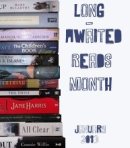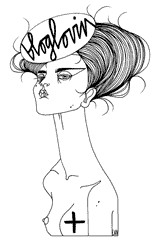Silence by Shusaku Endo
23 January, 2013
Lord, why are you silent?
Why are you always silent…..?
Shusaku Endo’s Silence is probably his most famous novel. Like The Samurai and The Volcano, it is a study of Christianity in early modern Japan and the terrible path it carved through the lives of its believers and those who tried to stamp it out.
It is almost 60 years after Francis Xavier’s successful mission to Southern Japan. But the Tokugawa Shogunate, fearing the growing popularity of Christianity amongst the country’s poor and the possible fomentation of anti-government sentiment, has closed Japan’s doors against outsiders, leading the country into self-imposed isolation and declaring a ban on Christianity. It is in this harsh period of forced apostasy and danger that the Jesuit priest Sebastian Rodrigues and his companions set out from Portugal to discover the fate of their teacher, Christovão Ferreira, who has disappeared in Japan after rumours of his apostasy sent shock waves across the Christian world. Via Macao, they board a ship to a village near Nagasaki and there, their ideas and views on their vocation and the land they had dreamt of comes under increasing attack as they realise that the path they have chosen is harsher than anything they ever expected.
My reading of Silence as a non-Christian will probably differ from those who do believe, and yet, I feel that Endo successfully manages to get to the root of what he is trying to portray and shows the reader the real, honest and true anguish of someone who is trying to understand what it means to have faith and to live their life in a true and meaningful way.
I don’t think I have ever come across another novelist who has managed to do this in such a searing portrayal of a man struggling against fear and doubt and still trying to do justice to his vocation. Rodrigues is constantly treading water, at the edge of desperation, as he sees his flock captured, forced to step on fumie and apostatise, tortured and killed. He is perpetually caught between wanting to end the suffering of the Japanese Christians and staying true to his vocation, that he must continue his mission to spread and uphold his faith in Japan. It is a struggle from the beginning as most Christian converts are from the lower orders of the social hierarchy; many are peasants who are struggling with poverty and whose lives are hellish.
for a long, long time these farmers have worked like horses and cattle; and like horses and cattle they have died. The reason our religion has penetrated this territory like water flowing into dry earth is that it has given to this group of people a human warmth they never previously knew. For the first time they have met men who treated them like human beings.
You are there with Rodrigues as he jumps from one painful situation to the next, always shadowed by his Judas, the wretched, weak apostate Kichijiro, until he is finally captured himself. And there he comes face to face with the man he has come to Japan to find, his teacher Ferreira. And this is where his real struggle begins.
SPOILER ALERT (click and highlight to see text)
I was expecting Rodrigues to die at the end of the novel. But what Endo has done is something I hadn’t expected. Something much worse. And also something which really drives home and makes you think about what it must mean to have true faith. Does the fact that you have stepped on a fumie mean that you are an unbeliever? Can you really choose between stopping someone’s torture and keeping your own hands clean? And most importantly, Rodrigues finally believes that God had spoken to him and shown him the way, that by apostatising, he has become a true Christian and is saving his brethren from death. I may have gotten this all wrong but I found the ending to be truly painful but the fact that Rodrigues did not take his own life must mean that although he has no choice but to comply with his captors, he has found some kind of peace within himself and found meaning in his Christianity. But I’m not really sure.
END OF SPOILER
Endo’s portrayal of Rodrigues is that of a real blood, sweat and tears man. A man who is struggling with what he believes and what he thinks is the right thing to do. It’s a vital, anguished portrayal but one which really touched me. There are hardly any clean, beautiful characters in this novel. It’s raw and gritty and wretched. And yet it stays with you. The Samurai showed how Christianity lifted some of the burden from the lives of the poor peasants in feudal Japan but Silence shows how much the Japanese and their Portuguese priests had to give up in order to protect their faith.
There is a word in Japanese, shugyo (修行), which loosely translates as an apprenticeship or training with roots in Buddhism. It’s often used to denote a period of training that one must undergo in order to become stronger, to achieve success or some sort of enlightenment. Rodrigues’ ordeal is akin to this. He doesn’t shy away from it, knowing that he must get through it in order for there to be some meaning in his life, for there to be a link with his faith.
I finished reading Silence almost two weeks ago but Rodrigues’ struggle still lingers in my mind as I try to understand whether he managed to come to terms with his choices. I am in awe of what Endo has accomplished here (together with William Johnston’s superb translation) and will definitely be seeking more of his novels to read as I hope some of you will too.
Do check out Bellezza and Tony‘s posts and Tanabata‘s discussion of Silence and Teresa has posted on a new translation of Kiku’s Prayer.
*Do also check out Teresa’s post on re-reading Silence.
I read this as part of Bellezza‘s Japanese Literature Challenge 6, Tony‘s January in Japan and Ana and Iris‘ Long Awaited Reads Month.















23 January, 2013 at 12:23 pm
This sounds great.
24 January, 2013 at 10:31 am
It is, Lyndsay. I hope you read it!
23 January, 2013 at 12:30 pm
Glad you liked it 🙂 It’s a great book by a writer who should be much better-known than he is.
24 January, 2013 at 10:33 am
I totally agree. I think Endo is an incredibly honest writer dealing with some really profound issues.
23 January, 2013 at 4:01 pm
be interesting to she some one with real faiths take on this ,I haven’t read much by him ,I keep meaning to try more of his books ,all the best stu
24 January, 2013 at 10:55 am
I’ll point you to Teresa and Bellezza‘s reviews, Stu! I’ve got a couple more books by him and plan to read more.
24 January, 2013 at 12:06 am
Your reading of the ending is quite similar to my own. As a Christian, I was taught that the worst thing you could do was to deny your faith in Christ–it would be a betrayal–and I think Rodriguez shares that perspective. But the ending turns that whole notion on its head and makes the denial an act of faith. Instead of relying on his own declarations about God, he had to rely on God’s mercy. It’s a huge leap, and the whole idea transformed the way I think about faith.
24 January, 2013 at 11:22 am
Yes! That’s exactly what I was trying to say but couldn’t articulate. So thank you! It’s a really difficult and subtle notion and I think Endo manages show that in a dignified way. I had to read the ending a few times before it began to sink in which made me appreciate Endo’s talent even more.
24 January, 2013 at 12:11 am
I found this book very haunting as well.I think I’m do for a reread.
24 January, 2013 at 11:23 am
I think it’s one of those books that needs to be re-read and I will be doing so in the future too. And haunting is the perfect word to describe it.
24 January, 2013 at 1:49 am
I read this several years ago and still remember the effect that Endo created. It was almost painful, especially from the point of view of a believer. He did a fantastic job with Wonderful Fool, too, where he created an admirable Christ-like figure. In my opinion, he succeeded in creating a truly good soul far better than Dostoevsky attempted to with The Idiot. Your review on Silence is quite excellent, making me want to read it again. Thanks, Sakura.
24 January, 2013 at 11:25 am
Thanks Bellezza. I found it painful and can only imagine what effect it must have had on you. I will be reading more of Endo’s work including Wonderful Fool and will also have to read The Idiot now that you’ve compared them.
24 January, 2013 at 4:57 pm
I also love this book, and understand why it’s his most famous. But I actually love Deep River even more; same struggle but much more recent context….brilliant.
29 January, 2013 at 5:07 pm
I haven’t read Deep River yet but I am planning on reading more by Endo. I’m happy to see that there’s so much love for his books even though they aren’t the easiest to read.
26 January, 2013 at 3:55 pm
Wow, that sounds like one intense read. It is easy to forget in the relative ease and prosperity of American Christianity all the struggles that people of faith went through and still go through in other countries just to practice what they believe. Makes me ashamed at how easily I succumb to grumbling and complaining sometimes, about anything under the sun.
29 January, 2013 at 5:07 pm
It certainly does. The fact that it’s based on read events makes it even more harrowing.
9 February, 2013 at 3:38 am
What a great review! I have been meaning to read Silence for a long time…it’s definitely moving closer to the top of the list now.